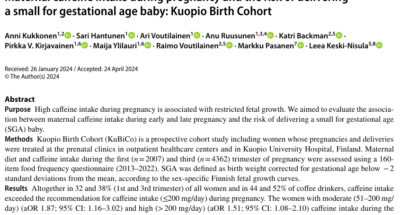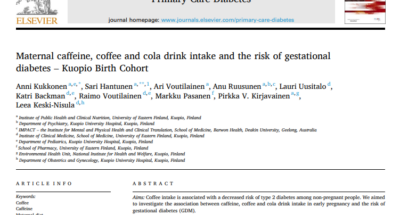
Kuopio Birth Cohort (KuBiCo)
The Kuopio Birth Cohort (KuBiCo) project will generate new knowledge by integrating clinical and analytical data, achieving a stepwise increase in understanding of the combined effects of multiple factors on health and disease. The KuBiCo is aimed to resolve effects of genetics and different stress factors (medicines, nutrition, lifestyle factors and environmental aspects) during pregnancy on health status of the mother and the child. Altogether the final data base will include 10000 mother-child pairs. All pregnant women who will give a birth at Kuopio University Hospital can participate in the KuBiCo project. The KuBiCo project is a joint research project between University of Eastern Finland (UEF), Kuopio University Hospital (KUH) and National Institute of Health and Welfare (THL). The project has been approved by the Research Ethics Committee of Hospital District of Central Finland.
During pregnancy, mothers fill out electronic research forms regarding, among other things, living conditions, nutrition and the progress of the pregnancy. Birth data is obtained from the KUH birth register, and KuBiCo has also collected, for example, placental samples and samples of the hair of the newborn child in connection with childbirth. The collection of placental samples has been restarted in September 2025 and will continue until the end of 2026. The children participating in the study and their parents will be monitored annually using electronic forms and possible research visits.
The project is anchored in the concept of developmental origin of diseases. In addition, it is well known that maternal health status during the pregnancy also predicts future wellbeing of the mother. Final study material consists of 10000 study subjects (mother-child pairs), related questionnaire database, and a large collection of biological samples.
KuBiCo’s PI is a professor Leea Keski-Nisula
News
-
 Fear of childbirth is associated with shorter duration of breastfeeding
Fear of childbirth is associated with shorter duration of breastfeedingFear of childbirth is associated with shorter duration of breastfeeding
The duration of breastfeeding is shorter than average among mothers with a fear of childbirth – regardless of the mode of delivery, a new study from… -
 Maternal caffeine intake during pregnancy and the risk of delivering a small for gestational age baby: Kuopio Birth Cohort
Maternal caffeine intake during pregnancy and the risk of delivering a small for gestational age baby: Kuopio Birth CohortMaternal caffeine intake during pregnancy and the risk of delivering a small for gestational age baby: Kuopio Birth Cohort
High caffeine intake during pregnancy is associated with restricted fetal growth. We aimed to evaluate the association between maternal caffeine… -
 The green living environment in early childhood does not protect against eczema
The green living environment in early childhood does not protect against eczemaThe green living environment in early childhood does not protect against eczema
According to a new Finnish study, greenness around the home in early childhood does not seem protect children from atopic eczema. Instead, the… -
 Maternal caffeine, coffee and cola drink intake and the risk of gestational diabetes – Kuopio Birth Cohort
Maternal caffeine, coffee and cola drink intake and the risk of gestational diabetes – Kuopio Birth CohortMaternal caffeine, coffee and cola drink intake and the risk of gestational diabetes – Kuopio Birth Cohort
Coffee intake is associated with a decreased risk of type 2 diabetes among non-pregnant people. We aimed to investigate the association between…
The Nirvana Study Investigates Sleep Disorders During Pregnancy
Obstructive sleep apnea is a sleep-related breathing disorder characterized by repeated pauses in breathing during sleep. Sleep apnea negatively impacts quality of life. Symptoms include daytime fatigue, memory problems, snoring, non-restorative sleep, feelings of choking during sleep, gasping for air, dry mouth upon waking, difficulty concentrating, mood disorders, restless sleep, fragmented sleep, difficulty falling asleep, and insomnia.
Sleep apnea also occurs in pregnant women, for whom the condition can cause serious comorbidities and affect the developing fetus. During pregnancy, sleep apnea can predispose women to pre-eclampsia, gestational hypertension, and gestational diabetes. Sleep apnea can also increase the risk of preterm birth, the newborn requiring intensive care, lower birth weight, and developmental disorders. It is also estimated that sleep apnea is more prevalent in pregnant women than currently diagnosed, due to a lack of validated screening tests and challenging diagnostic practices. Research data on sleep apnea in pregnant women is still limited.
The Nirvana study investigates the prevalence of sleep apnea during pregnancy in the North Savo region. We study the effects of sleep apnea on the health of pregnant women and newborns. The information obtained from the study can also be used to determine who should be offered sleep apnea studies during pregnancy in the future.
Nirvana Study Responsible Persons Professor Marjo Tuppurainen and MD Johanna Masar Obstetrics and Gynecology, UEF and KYS, PSHVA
Nutrition
Pregnancy, as a unique stage of life, may pose nutritional challenges for the mother, but it is also a period that may contain great opportunities to influence the lifelong health of the unborn child.
The KuBiCo project investigates the effect of food and nutrients, nutritional supplements and food-derived compounds on the progress of pregnancy and health of the mother and child. The mother’s diet and the use of supplements are investigated in the first and last trimester of pregnancy using web-based surveys. Mothers receive personal feedback on the quality of the diet by email after completing the survey. The feedback also includes mirroring the diet in relation to valid nutritional recommendations.
The nutrition part examines not only the connection between nutrition and the progress of pregnancy and the well-being of the mother and child, but also the transfer of nutrients from the mother’s diet to the fetus during pregnancy. For this purpose, umbilical cord blood and placenta samples have also been taken from some of the KuBiCo mothers, and hair samples from some of the newborns for metabolomics studies. The research question is, for example, how much substances (e.g. caffeine) are found in the hair samples of newborns and whether these metabolites are connected to the children’s later health status.
Approximately 350 nutrients and food groups have been assessed from food frequency questionnaires during pregnancy. The project also investigates children’s food consumption and nutrient intake up to the age of 7.
Group leader:
Adjunct Professor, Nutrition epidemiologist Sari Hantunen
[email protected]
Mental wellbeing
We investigate how maternal psychological wellbeing is associated with circulating maternal and newborn biomarkers during pregnancy and after delivery. We also aim to determine how maternal mental wellbeing during pregnancy affects child health and wellbeing in a long-term follow-up.
Our multidisciplinary approach allows gaining a wider perspective on how maternal mental wellbeing modulates physiological responses in the mother and the newborn. We hope that further understanding of these mechanisms will help to facilitate children’s health in the future.
Group leader:
Soili Lehto
Professor in Psychiatry, University of Oslo
[email protected]
Environment
The effect of different environmental exposures on the development of the fetus and the child is investigated by the Environmental Health unit of the National Institute for Health and Welfare. Particular interest of the workgroup in the KuBiCo is on environmental determinants of asthma and allergic diseases, especially exposure to the microbes in indoor air and air pollution, and on the effect of environmental chemical exposure to health and development of the offspring. Environmental exposures are assessed in KUBICO with comprehensive questionnaires. In addition, biological samples are collected for the chemical and microbiological analyses.
Environmental Health unit is one of the leading groups on the field of environmental health in Europe and has executed several epidemiologic studies, including birth cohort studies. Environmental Health unit has the ability to produce extensive microbiological and chemical analyses.
Group leader:
Adjunct Professor Pirkka Kirjavainen
Finnish Institute for Health and Welfare
[email protected]
Human placental metabolism and 'omics'
Maternal exposure to chemicals and drugs during pregnancy will affect the well-being of the mother and newborn child, putatively over generations, by causing modifications at RNA, DNA (genetics /epigenetics) and protein level which may contribute to the developmental origin of diseases.
In the present project we’ll study how the above mentioned stress factors affect placental hormonal production (potential for endocrine disruption) and xenobiotics metabolizing characteristics at different stages of pregnancy. Methods used are primary and secondary cell cultures, placental enzymatic determinations in vitro, gene expression profiling studies, epigenetics and proteomics.
Group leader:
Professor Jaana Rysä
[email protected]
Pediatrics
We will survey the health of the children by annual questionnaires. Our aim is to study the association of pregnancy conditions (for example smoking) and microbe exposure in infancy with health and morbidity of the subjects in later childhood, adolescence and adulthood. We will investigate also the effects of pre-eclampsia and birth size of the children (SGA, small for gestational age; LGA, large for gestational age) on later health, diseases, and disease risks of the subjects; the last ones include the risk factors associated with adult cardiovascular diseases.
The multidisciplinary KuBiCo project and its network will offer excellent possibilities to study the associations of nutrition and environmental exposures during pregnancy and early childhood with childhood growth, development and diseases in later life. The project can shed light on the etiology and pathogenesis of the most common developmental and health problems of childhood, for example overweight and obesity, asthma, allergy, cryptorchidism, ADHD, and diabetes.
Group leader:
MD Katri Backman
Kuopio University Hospital (KUH)
[email protected]
Keywords
Researchers, UEF
-
Leea Keski-Nisula
ProfessorInstitute of Clinical Medicine, School of Medicine, Faculty of Health Sciences -
Roosa Jokela
Project ResearcherInstitute of Public Health and Clinical Nutrition, School of Medicine, Faculty of Health Sciences -
Raimo Voutilainen
Professor, EmeritusInstitute of Clinical Medicine, School of Medicine, Faculty of Health Sciences -
Katri Backman
Visiting ResearcherInstitute of Clinical Medicine, School of Medicine, Faculty of Health Sciences -

Sari Hantunen
Senior University LecturerInstitute of Public Health and Clinical Nutrition, School of Medicine, Faculty of Health Sciences -

Tomi-Pekka Tuomainen
ProfessorInstitute of Public Health and Clinical Nutrition, School of Medicine, Faculty of Health Sciences -
Pirkka Kirjavainen
Senior ResearcherInstitute of Public Health and Clinical Nutrition, School of Medicine, Faculty of Health Sciences -
Jaana Rysä
ProfessorSchool of Pharmacy, Faculty of Health Sciences -

Olli Kärkkäinen
Associate ProfessorSchool of Pharmacy, Faculty of Health Sciences -

Anni Kukkonen
Doctoral ResearcherInstitute of Public Health and Clinical Nutrition, School of Medicine, Faculty of Health Sciences -
Heidi Sahlman
University LecturerSchool of Pharmacy, Faculty of Health Sciences -

Ilona Luoma
ProfessorInstitute of Clinical Medicine, School of Medicine, Faculty of Health Sciences
Other group members
Publications
32 items-
Alterations in the Plasma Metabolome Associated With Maternal Smoking During the First Trimester and Foetal Growth
Masvosva, Wadzanai; Voutilainen, Taija; Lehtonen, Marko; Haikonen, Retu; Auriola, Seppo; Keski‐Nisula, Leea; Rysä, Jaana; Kärkkäinen, Olli, 2025, Basic and clinical pharmacology and toxicology, 136, 5, 1-11. A1 Journal article (refereed), original research -
Avocado consumption during pregnancy linked to lower child food allergy risk: prospective KuBiCo study
Cheng, Feon W.; Bauer, Ella; Ford, Nikki A.; Backman, Katri; Voutilainen, Raimo; Pasanen, Markku; Keski-Nisula, Leea; Hantunen, Sari, 2025, Pediatric research, [Published: 07 March 2025], 1-7. A1 Journal article (refereed), original research -
Earlier pregnancies in nulliparous women with current father and lower risks for preeclampsia and low-birth weight newborns
Hurme, Veera; Honkanen, Reetta; Backman, Katri; Karvonen, Anne M; Kirjavainen, Pirkka; Keski-Nisula, Leea, 2025, Journal of reproductive immunology, 168, 104431. A1 Journal article (refereed), original research -
Longitudinal metabolic profiling of women using selective serotonin reuptake inhibitors during pregnancy
Itkonen, Anna; Kärkkäinen, Olli; Sahlman, Heidi; Keski-Nisula, Leea; Rysä, Jaana, 2025, Metabolomics, 21, 5, 123. A1 Journal article (refereed), original research -
Maternal exercise during pregnancy is associated with reduced risk of asthma in the child: A prospective birth cohort study
Musakka, Emma-Reetta; Ylilauri, Maija Paula Tuulia; Jalanka, Jonna; Karvonen, Anne Maarit; Täubel, Martin; Hantunen, Sari; Lehto, Soili Marianne; Pekkanen, Juha; Backman, Katri; Keski-Nisula, Leea; Kirjavainen, Pirkka Viljami, 2025, Med, 6, 2, 100514. A1 Journal article (refereed), original research -
Ravintolisien käyttö raskauden aikana Pohjois-Savossa
Kortelainen, Hanna; Rysä, Jaana; Hantunen, Sari; Keski-Nisula, Leea; Sahlman, Heidi, 2025, Dosis, 41, 1, 56-71. A1 Journal article (refereed), original research -
Associations of gestational anxiety and depression with neonatal hair steroid levels
Chortatos, Arthur; Vittersø, Axel Davies; Uusitalo, Lauri; Lehtonen, Marko; Huotari, Johanna; Auriola, Seppo; Voutilainen, Raimo; Backman, Katri; Keski-Nisula, Leea; Lehto, Soili M, 2024, Psychoneuroendocrinology, 172, 107260. A1 Journal article (refereed), original research -
Delayed umbilical cord clamping in elective and nonelective term Cesarean delivery
Lummevaara, Liina; Ordén, Maija-Riitta; Mykkänen, Anu; Keski-Nisula, Leea, 2024, Journal of gynecology obstetrics and human reproduction, 53, 2, 102717. A1 Journal article (refereed), original research -
Fear of Childbirth Impairs Breastfeeding Success Independent of Mode of Birth
Vasanen, Maija; Kukkonen, Anni; Backman, Katri; Hantunen, Sari; Keski-Nisula, Leea, 2024, Breastfeeding medicine, 19, 12, 932–940. A1 Journal article (refereed), original research -
Maternal caffeine intake during pregnancy and the risk of delivering a small for gestational age baby: Kuopio Birth Cohort
Kukkonen, Anni; Hantunen, Sari; Voutilainen, Ari; Ruusunen, Anu; Backman, Katri; Kirjavainen, Pirkka V.; Ylilauri, Maija; Voutilainen, Raimo; Pasanen, Markku; Keski-Nisula, Leea, 2024, Archives of gynecology and obstetrics, 310, 1, 359-368. A1 Journal article (refereed), original research
